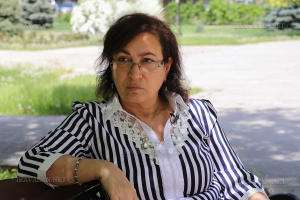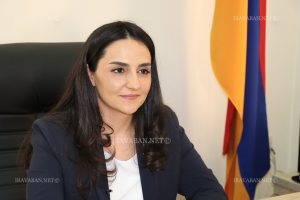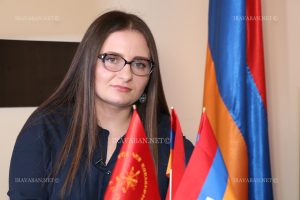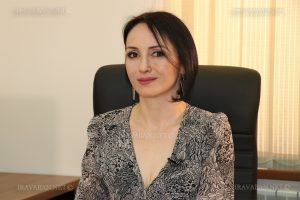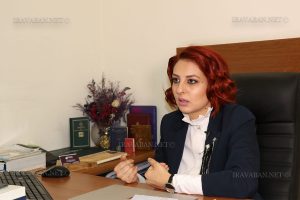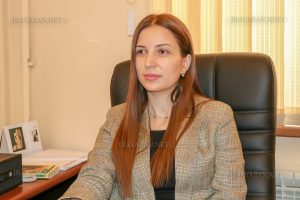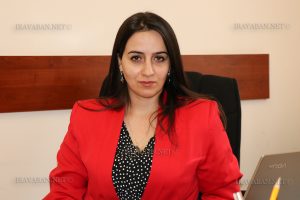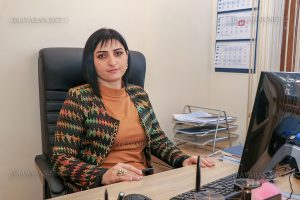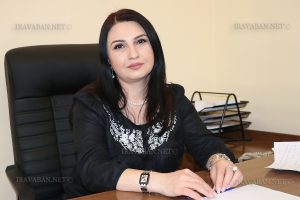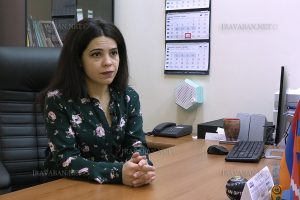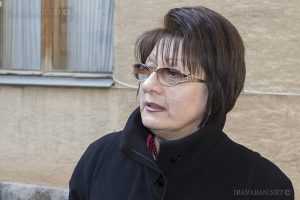Nazeli Baghdasaryan, a member of “My Step” faction the National Assembly’s, has returned to the National Assembly after 14 years. In 2003-2005 she worked as an assistant to the chairman of the NA Standing Committee on State and Legal Affairs, and currently she is MP.
Was Born and raised in Gyumri, she holds a Master’s Degree in Law. For many years she has been working as a TV anchorwoman.
Several months before being elected a Deputy, she held the post of Advisor to Shirak Governor.
Within the framework of the “Women in the Legislative” series, we interviewed Nazeli Baghdasaryan about her activities in the legislature, about the transitional justice and her family.
– Ms Baghdasaryan, in 2003-2005, you were the assistant to the Chairman of the NA Standing Committee on State and Legal Affairs. Did you ever think then that after years you will return to the National Assembly as a deputy?
– Frankly speaking, the work in the legislature has always attracted me and the fact that I had had the opportunity to acquire this experience and skills at the National Assembly at a younger age, always gave up hope to me that I shall be able to return to the National Assembly again. I cannot say as a deputy, but as an expert or a member of the staff, yes. I have never excluded this opportunity.
-What is attractive in work in the legislature?
– I think that it is very important for any lawyer to communicate directly and to engage in law-making activities, to understand what the laws are based on, what means and methods they are written with, and what the laws are aimed at.
– By examining the statistics of the 6th and 5th convocation of the National Assembly, we see that the “lion’s share” of the legislative initiatives belong to the government.
– I believe that in lawmaking it is necessary to understand where the laws come from. In this case, it is natural that the government has the status of a main lawmaker because, as an executive body, having direct contact with the sphere, understands the gaps in it. Another thing is that in many cases the members of the government cooperate with the NA committees, and the approaches are common. There are many cases that we are now trying to come up with legislative initiatives and understand that the government is already working on that bill. It does not matter who is the author of the law, it is important for the law to serve to the ultimate goal and its people.
– What Bills are needed? What problems do you see in the field?
– The problem of transitional justice remains a priority for me and in the near future, and I think, I shall put the main emphasis on these initiatives. We have already received from the Ministry of Justice, information on the work that the ministry carried out in this field, now they are at the stage of study. The government left the main initiative in this area to the National Assembly, as there is no word about transitional justice in the government’s program. But currently we are discussing the approaches and models that we try to carry out.
– A few days ago, the NA State Legal Commission adopted the first bill related to the logic of transitional justice on 1-2 March events.
“You see, the recent amnesty was also in the logic of transitional justice, as well as the bill you mentioned.
When we talk about transitional justice, many grasp it that there should be lynching and the law should be implemented in other ways. Naturally, this is not the case. The suggestion, first, should be justified by basic law, be legal and within the scope of the law, taking into account the international obligations that the Republic of Armenia has undertaken. If we are a legal country, no process can undermine this mechanism, but we see that today in Armenia we have a lot of institutional issues that cannot be solved by the usual procedure. This is the reason why transitional justice elements come to help us and we are trying to invest those elements in the legal field. We have a problem in the justice system. This is an indisputable fact and yes we know that, the revolution was initially implemented in the executive body, and then in the legislative.
This can be a subjective opinion, but our judicial system is lame. We must have justice because we can move forward on its basis. Not only Themis’ eyes are under blindfold, but her ears are closed as well and nothing is touched.
– When will the positions of the NA “My Step” Faction or the General legislator related to transitional justice be ready?
– I would not like to hurry in this issue because the problem is very sensitive. We are now studying the international experience and trying to localize all this. The Constitution of the Republic of Armenia provides the legal guarantees according to which the processes in the country should be implemented. Now, as a result of extensive studies, we try to find the ways out that will enable us to act within the scope of the law, but in the same way to get the mechanisms that are more than necessary in our present reality.
– Prior to being elected a Prime Minister, Nikol Pashinyan often spoke about creating an independent anti-corruption body. However, it seems that this option is not being discussed now.
It is because the law provides the anti-corruption body that should be created. It seems to me this can be the next stage. It is necessary to implement at least the minimum program of what we have fixed in the law, and to move build and move forward on its basis. You see, today we have the issue of meeting the deadlines, and even the process of forming that anti-corruption body has been delayed. It is a very important and clear idea.
– You conduct trainings on public speeches and publicity. Does it help you?
– I believe it helps to the extent that I do not have problems with the construction of speeches or clarity of speech, and I am not constrained in any way. My work experience of previous years, as well as on television, contributes to that, but the National Assembly itself is not a place for merely making speeches. In addition to telling stories, we must hang a bell as well and now it is time for it.
– You are a lawyer and have worked as a journalist. MP Lusine Badalyan separated a list of media in her well-known post urging to refrain from giving interviews to other media beyond this list. What is your opinion on this as a lawyer and as a journalist?
-It is not right ethically to comment on what my colleague said, but I think that every person has his or her subjective views and needs to understand that the public figure may be a target of a lot of criticism. This also implies the political position we occupy. Yes, criticisms are painful, especially when criticism is not justified. But if you are a public figure, no matter to what extent you are protected by law, you should be ready at any point that any media can make you its target. This should be understood when assuming this post.
The MP is not limited to expressing his or her opinion; the human being has an opinion and is free to express. If the individual considers so, then such observations have no justification.
– You mentioned in one of your posts that the media tries to divert the attention from more important topics through manipulations creating artificial and fake agendas. Can you bring some examples and tell what is worth to more attention.
– Political technologists around the world use this method. Not only in the media, but also in social networks, there is some information that allows studying the public opinion, enabling them to distract from the actual issues that exist and targeted at different people within the scope of the given issue.
We periodically see that a certain topic on the Internet is flaring up for a few days, and then that wave fades.
The high level of unemployment, social conditions, these are issues on agenda for me, and the phenomena that exist and we cannot exclude them, which raises much ado about nothing unnecessarily. And I think you will also agree that these are false agendas.
However the media manipulations are not new tricks. It is not me that have invented it. This is a trick that is being implemented in a very flexible manner. Another question is how the audience perceives this; to what extent is the audience ready to deal with these phenomena?
It is a fake agenda, for example, a transgender woman’s speech during the recent parliamentary hearings. I would like the public to read any bill that is accepted with the same readiness and consider its positive and negative aspects.
During the last special session three draft laws were adopted in the first and second reading. I would like to have a discussion focused on the ideological basis. I do not think that simply focusing on topics of public interest will have a positive and good effect, and I do not think that this issues from the deputy’s functions.
Do you think that the transgender woman’s statement was also important in this case? It was about violence, discrimination and a number of other criminal offenses. Do you think that a bill on sexual minorities will be developed in Armenia in 3-4 years?
– I cannot say but I remember clearly that this article of the Criminal Code was decriminalized and it was not during the rule of this government. I do not deny either the circumstance that every person has the rights, but the right of anyone should not limit the right of the others. If there are problems, let the law enforcement agencies deal with it, but the question is, for what purposes are the different platforms of the country being directed and used?
– Vahagn Hovakimyan, a member of the “My Step” faction, recently announced that the Armenian citizen is no longer thinking about emigration. Do you agree with this idea?
– We have to do everything to ensure that people do not have such ideas. Why does a person emigrate? He does not emigrate from good life. First of all, a citizen must feel protected in his country, have a job, and have social guarantees that he and his family can be protected in the country. If I did not believe in that idea, I would not be here today.
– You were born in Gyumri. Do you live in Yerevan now?
– During the plenary sessions and the sessions of the factions I am in Yerevan, I spend the rest of my time in Gyumri, because it is important to keep in contact with the electorate for a deputy elected according the territorial list. My family lives in Gyumri. It is a little difficult, but the job requires.
– What issues do the voters raise?
– Mostly social problems. Shirak is the region with the poorest and the unemployed in Armenia and there are many social problems here. During our interview we also noticed a regular phone call. People want a job so they can take care of their needs. This may not be the function of the NA deputy, who cannot ensure a workplace, but can direct the personnel bank. As you know the prime minister’s staff was replenished with new staff, the same personnel bank, which seemed for many from the genre of fairy-tales. Formerly, the regime of acquaintances and protégés was operating, and the people did not even apply. Now it is good that the level of this belief has risen and people can feel important themselves in this state.
– How many phone calls do you get during a day?
– I cannot say for sure, but we receive quite a lot of calls, letters and notices. The MP also has meetings with voters during his tenure. We have already had such meetings in Gyumri, the days will become warmer and will visit other settlements of the Shirak marz as well. We simply direct the people in the scope of the law. People are not aware of the laws, having no legal knowledge, they do not know how to solve the problem.
I reply to every letter and note, even if I am not able to help, I will definitely respond. It is very important for the citizen to feel valued and important.
– Do you know how many citizens that applied to you have found job?
– I cannot say because, frankly speaking, I did not follow the course of the process. I do not support just for registering the index. ‘See, 10 people have applied, 9 have found jobs,’ because it is not really the deputy’s function.
-You are a new person in the parliament. Can you tell about your family?
– We are three in the family: My husband, my son and me. We are a small family, but we are warm, and probably we can expand in the future. The work hinders further plans. We are a solid family, where mutual respect is important and this is very important to me. Everyone in our family, regardless of age and gender, has the right to vote. We solve many questions in trilateral format.
My son, despite his young age, plays an active role in our decision-making, sometimes having a key role. It is very important for me that a child from an early age understands that he is a free and independent citizen of Armenia.
Last year, when my son went to the first grade, I left such a record. “My son is a free and independent citizen of Armenia, who will protect his rights.” The revolution had not started yet.
The citizen should feel it from the school bench.
-Were your family members ‘for’ your will to become MPs?
– When I was elected a deputy, we said that I would go to Yerevan and so on. But my son was saying, “I do not understand have been elected MP from Yerevan? And have you asked me?” Realizing that the main work would be located in Yerevan, he was opposed a little. My husband and my parents have left this responsible decision to me. When I agreed to assume the post of the Advisor to the Governor of Shirak Marz, it was supposed that this was the first step to entering the political path.
Interview by Yevgenya Hambardzumyan
Photos by Zakar Iskandaryan
Author of the idea – Karen Zadoyan



